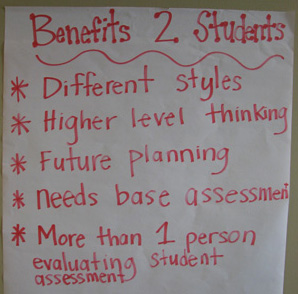 While observing the one-hour workshop cooperation and a collaboration planning session role play, the preservice principals in the TWU Professional Development and Supervision course identified the items (on the post-it pictured) as benefits to students.
While observing the one-hour workshop cooperation and a collaboration planning session role play, the preservice principals in the TWU Professional Development and Supervision course identified the items (on the post-it pictured) as benefits to students.
The principals noticed that students would benefit from instruction provided by two (or more) educators with different teaching styles. When the preservice principals shared this bullet, they also talked about how the instruction that was planned addressed students’ various learning styles as well.
They noticed that through collaboration the educators pushed the instruction to a higher level. Critical thinking was a focus of the lesson/unit planned. The collaborative planning session revised a previously taught Civil War unit that focused on heroes and battles (what David Loertscher calls a “bird unit”) and involved students in an inquiry process in which they would develop personally-meaningful questions about the war.
Targeted assessment and shared responsibility for assessing the learning outcomes were also important to these preservice principals. School librarians can excel in gathering locally-generated formative assessment data to demonstrate the impact of instruction on student learning outcomes. This aspect of evidence-based practice is essential in today’s learning and teaching environment.
I want to thank the students in Dr. Starrett’s ELDR 5223 Professional Development and Supervision Fall ’12 class for allowing me to share the “library story” and for sharing their insights with me/us.
Reference
Loertscher, David V., Carol Koechlin, and Sandy Zwaan. Beyond Bird Units: Thinking and Understanding in Information-Rich and Technology-Rich Environments. Salt Lake City: Hi Willow Research and Publishing, 2008.
